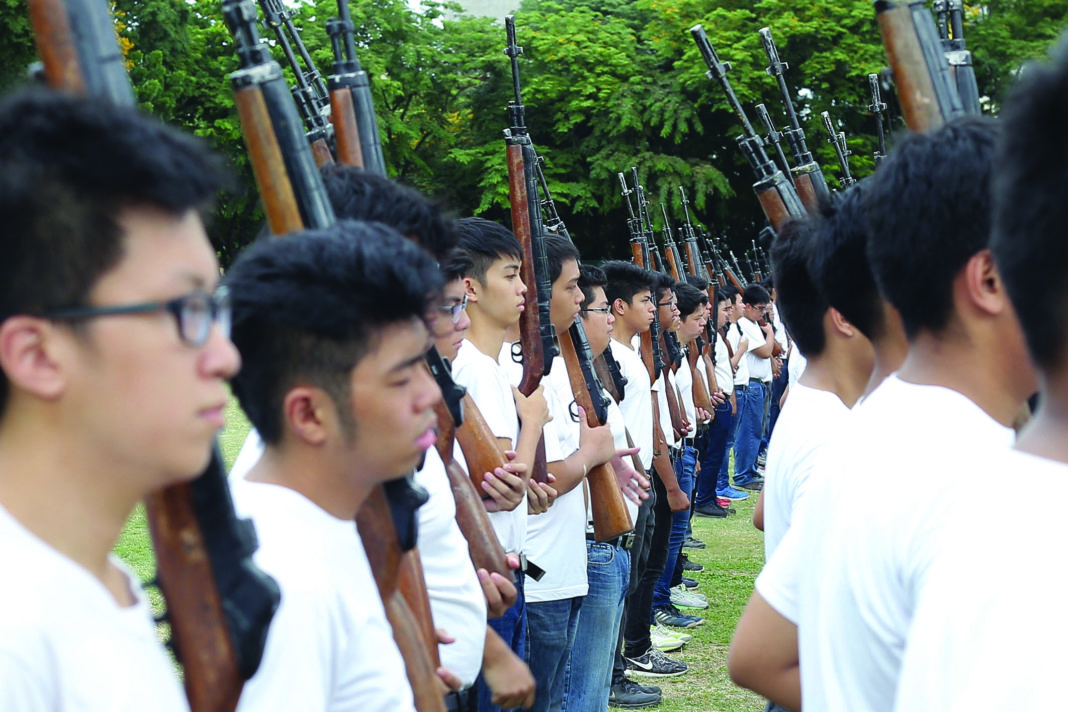OPPOSITION is brewing among students, educators and lawyers on the proposed National Citizens’ Service Training (NCST) program, which recently passed the House, given the abuses of the Reserve Officers’ Training Corps (ROTC) when it was still compulsory in college.
The bill establishing NCST, which breezed through the lower chamber with 276 yes votes after President Ferdinand “Bongbong” Marcos Jr. certified it as urgent, would mandate all students in undergraduate programs in higher educational institutions (HEIs) to take advanced military subjects and undergo field exercises for four semesters.
Marcos Jr. said in his first State of the Nation Address that the bill aims “to motivate, train, organize and mobilize the students for national defense preparedness, including disaster preparedness and capacity building for risk-related situations.”
But human rights lawyer and former senatorial candidate Jose Manuel “Chel” Diokno is concerned about the ramifications of NCST to civil liberties.
“[M]arami akong concerns diyan dahil bilang human rights defender baka naman ang mangyari diyan ay lalo pang maliitin ang kahalagahan ng pangkarapatang pantao. Maaari siya maging weapon para maisulong ang mas militaristic type of society sa atin,” Diokno told the Varsitarian.
According to the National Union of Students of the Philippines (NUSP), at least 14 cases of hazing, sexual abuse, physical assault and murder have been recorded since 1995 under ROTC, despite its claim “to instill nationalism and patriotism.”
For the Catholic Educational Association of the Philippines (CEAP), the country’s largest network of private Catholic schools, justice must first be sought in these cases.
“These unsolved cases and allegations must first be addressed and resolved before thoughts of reinstating ROTC should be entertained,” it said in its position paper opposing NCST and 34 other related bills submitted to the House Committee on Higher and Technical Education.
“[U]sing the school and civilian spaces for military training is also against International Humanitarian Law and other treaties,” it added.
NCST critics have pointed to the case of Mark Welson Chua as an example of the horrors of ROTC.
Chua, an engineering sophomore and cadet officer, uncovered the corruption, bribery and extortion in the University’s ROTC program alongside Romulo Yumul. On March 15, 2001, he went missing, and three days later, his body was found floating in the Pasig River.
Nothing new
Stakeholders lauded NCST’s objectives to train the Filipino youth in times of calamities and national emergencies, but they fear that its anti-student characteristics and militaristic culture will persist.
Lawyer Kristine Carmina Manaog of Estrada & Aquino Law, who specializes in education law, believes there should be a “thorough discussion” with major stakeholders before mandating NCST.
“This is to ensure that past controversies of abuses and corruption are addressed, and safeguards and mechanisms for accountability at the school level are clear and in place,” she told the Varsitarian.
The previous implementation of ROTC, she said, had “complete autonomy and separation,” lacking the necessary checks and balances that are vital in deterring abuses and corruption.
For Kabataan Partylist Rep. Raoul Manuel, NCST is just the same as mandatory ROTC, even if the government claims it isn’t.
“Kung titingnan yung esensya ng NCST, ay wala siyang pinagkaiba doon sa mga gustong mangyari ng mandatory ROTC. For example, part ng curriculum ng NCST ay soldier training or military training, na ‘yun din naman yung required sa mandatory ROTC,” Manuel told the Varsitarian.
Proponents attached an optional four-year ROTC program for students interested in joining the military. In any case, graduates will be automatically enlisted in the Armed Forces of the Philippines (AFP) Reserve Force.
UST Central Student Council President Nathan Agustin said at a House hearing in December that the current implementation of the National Service Training Program (NSTP) already provides a glimpse of the “potential horrors” of NCST.
Agustin claims that in one of the universities, “[a]n NSTP lecture was used by some unscrupulous officials to enforce red-tagging in the guise of citizenship training.”
On Nov. 7, 2022, retired military general Peale Bondoc, one of the speakers in an online NSTP lecture at the University of the Philippines Baguio, tagged progressive organizations Anakbayan, College Editors Guild of the Philippines (CEGP), League of Filipino Students (LFS), National Union of Students of the Philippines (NUSP) and Student Christian Movement of the Philippines (SCMP) as part of communist rebels.
Focusing on other things
Stakeholders believe nationalism is not just limited to militaristic ways and can be expressed through different means.
“[B]y instilling a sense of history, by exposing our students to realities of life and what we can do to make life better for the ordinary person, by making them understand na ‘yung mga ine-enjoy natin ngayon ng mga kalayaan at karapatan ay resulta ‘yan at produkto ‘yan ng mga sakripisyo ng mga nauna sa atin,” Diokno said.
Christian Paul Caro, a legal management freshman, commended the Civic Welfare Training Service (CWTS) program for raising national consciousness and training them on disaster and emergency response.
“Ang CWTS ay matagumpay na nagbigay ng kaalaman sa akin patungkol sa disaster preparedness dahil kami ay tinuruan at inatasan na mag-demonstrate ng iba’t-ibang first aid bandages at kung ano ba ang dapat gawin tuwing may sakuna,” he told the Varsitarian.
Instead of legislating NCST with “more loopholes for state propaganda,” lawmakers are urged to address the longstanding problems in the education sector.
The Programme for International Student Assessment (Pisa) and Trends in International Mathematics and Science Study (TIMSS), for instance, revealed in 2018 and 2019, respectively, that Filipino students have dismal performance in reading, mathematics and science.
In April, the United Nations Children’s Fund (Unicef) reported that three out of 20 schoolchildren couldn’t even read basic texts due to the closure of schools caused by the Covid-19 pandemic.
“[D]apat tutukan ng ating pamahalaan to make sure that our students will be at par or even better than the students of other countries. Dati kasi nasa itaas tayo, eh ngayon nasa bandang huli na tayo,” Diokno said.
Manuel expressed his disappointment with the Marcos Jr. administration for prioritizing NCST amid the “education crisis” and high “learning poverty.”
“It shows na sobrang detached ng Marcos Jr. administration sa kalagayan ng ating mga paaralan at ‘yung learning needs ng ating mga kabataan,” he said.
The proposed NCST is currently being debated in the Senate.












 IS THERE still a place for traditional poetry in a pragmatic and the fast-paced era?
IS THERE still a place for traditional poetry in a pragmatic and the fast-paced era?






